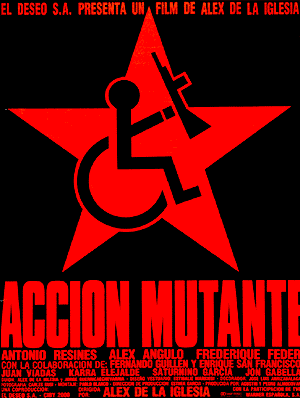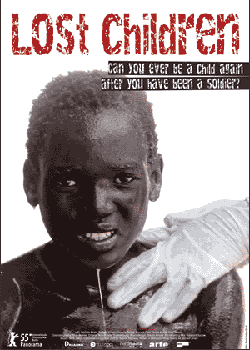Sometimes movies are more than just movies.
Roger Ebert wrote a scathing review of a sadistic horror film called “Chaos”. The creators responded, and then Ebert wrote this stirring response. (via tbit)
Top of the B-List
Sometimes movies are more than just movies.
Roger Ebert wrote a scathing review of a sadistic horror film called “Chaos”. The creators responded, and then Ebert wrote this stirring response. (via tbit)

I’m not really old enough to remember it, but the “Jesus People” movement was a full-blown phenomenon in the late 1960s and into the early 1970s. Centred mostly in northern California, hippies began getting into Jesus and these “Jesus Freaks” turned the established church on its ear. One of the most influential figures in this period was a young man with the unlikely name of Lonnie Frisbee. Lonnie’s ministry was influential in the foundation of two of evangelicalism’s biggest denominations. And yet, his name has disappeared from most accounts of the movement. Why? Because Lonnie was gay.
David di Sabatino has made a documentary film about Lonnie and it will be shown here in Toronto later this month as part of the Reel Heart Film Festival. I’m very interested in seeing it, but I do find one thing interesting. The director, who is an evangelical, talks about Lonnie’s homosexuality as a “struggle with sexual sin” and points to Lonnie as an example of a flawed prophet. Sadly, Lonnie died from AIDS in 1993, but I wonder what would have been the outcome if Lonnie had been able to embrace his sexuality and be accepted in the evangelical movement for what he was, without feeling like he had to live two separate lives.
Film critic Peter Chattaway conducted a lengthy interview with director di Sabatino back in April and the director says that Lonnie was raped as an eight-year-old child and that this might explain his fragmented identity, but I always find it funny that Christian people always need some “explanation” for someone’s sexuality. It’s more likely his fragmented identity was a result of not being able to tell people close to him about his homosexuality for fear of being denounced.
That being said, the film sounds like it genuinely tries to understand a complex individual, and I hope I’ll get to see it. It doesn’t hurt a bit that there are lots of Larry Norman songs in the soundtrack.
Note: Music was a huge factor in the Jesus People movement. Here’s a great site with lots of history on “Jesus Music”.
Ok, everyone knows I love movies. But I just wanted to relate that I just voted on my 500th movie over at IMDB. For the record, the film was House of Sand and Fog (2003) and I gave it an 8.

Tonight, we watched one of two films I picked up from Spanish director Álex de la Iglesia. He directed one of our favourite films from last year’s Toronto International Film Festival, called Crimen Ferpecto (Ferpect Crime) (2004), and I was happy to see two more of his films on DVD on one of my occasional visits to Bay Street Video.
Acción Mutante (Mutant Action) (1994) is his first film and it is set in a future society ruled by good-looking people. Acción Mutante are a terrorist group made up of disabled, ugly outcasts. Wacky and dark, but also full of biting satire about the media and the general superficiality of polite society.
We’ll watch the other one I picked up later this week. It’s called Muertos de Risa (Dying of Laughter) (1999) and it promises more skewering of the media and the entertainment business.
Note: I guess I’ve now voted on 501 films…
Dave is putting together a list. He’d better not forget my favourites: Philip Seymour Hoffman, William H. Macy, M. Emmet Walsh, John Turturro, and the inestimable Jack Kehler.

Lost Children (Germany/Uganda, 2005, Directors: Ali Samadi Ahadi, Oliver Stoltz, 98 minutes): All three of the films I saw today were about “children in peril” but none were more horrifying than this one. Northern Uganda has been caught up in civil war for almost twenty years. The rebels of the “Lord’s Resistance Army” make it their primary tactic to kidnap children from local villages, forcing them to fight in their army. Children as young as 8 are taught to kill with guns and knives, and those who don’t share in the atrocities are killed themselves, often by other conscripted children.
Catholic relief agency Caritas is running a reintegration centre for those children who manage to escape the rebel army. It is a formidable challenge. Often the children have physical injuries, either sustained in battle or in their harrowing escapes. The mental damage is much harder to repair. They often have nightmares, and are terrified of being reabducted. Their families are suspicious of them, and are also afraid of being targetted again by the rebels. In these circumstances, the social workers and doctors at the centre have their hands full.
We meet Jennifer, 14, who spent five years with the Lord’s Resistance Army, fighting government troops and terrorizing civilians, all the while being raped regularly as a commander’s concubine. And Opio, just 8 years old, describing how he bashed in a man’s skull with a rifle butt. Then there is sensitive Kelama, 13, who was forced to kill a woman in front of her child and who now can’t stop dreaming about her. All these children have a long road ahead of them, first reintegrating with their families and communities, and then hoping that the rebels don’t return for them.
It’s difficult to “rate” films like this, because they don’t really function as pieces of art. Instead, they fulfill another aspect of the documentary’s role, that of bearing witness. In that sense, this film is a clear-eyed look at some of the most horrifying crimes against children ever perpetrated. By making children do their killing for them, the so-called “Lord’s Resistance Army” have killed the childhoods of these children. As they piece together the shreds of their humanity, they are no longer children. What they will become is a mystery.
Information on helping the children here.
Coalition to Stop the Use of Child Soldiers
 (9/10)
(9/10)